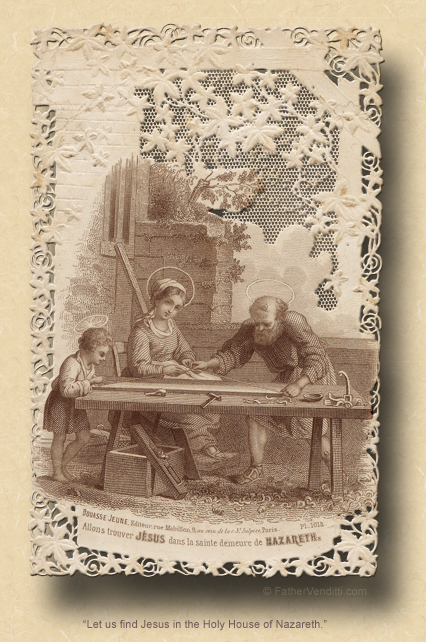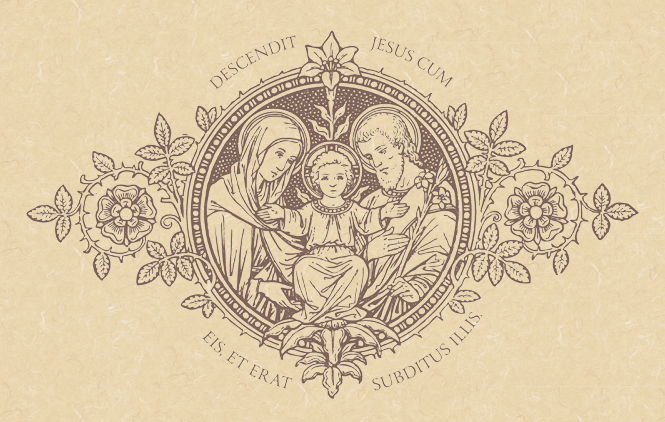Hate Your Family Sometimes? What You Need is Some Sawdust.
The Feast of the Holy Family of Jesus, Mary & Joseph.
Lessons from the primary proper, according to the ordinary form of the Roman Rite:
• Sirach 3: 2-6, 12-14.
• Psalm 128: 1-5.
• Colossians 3: 12-21.
[or Colossians 3: 12-17.]
• Matthew 2: 13-15, 19-23.
Ssunday Within the Octave of the Nativity of Our Lord.
Lessons from the dominica, according to the extraordinary form of the Roman Rite:
• Galatians 4: 1-7.
• Psalm 44: 3, 2.
• Luke 2: 33-40.
FatherVenditti.com
|
 6:51 PM 12/29/2019 — Pope Blessed Paul VI once said that “The home of Nazareth is the school where we begin to understand the life of Jesus—the school of the Gospel” (Paul VI at Nazareth, January 5th, 1964). But the first lesson we learn at that school is a lesson on silence. The whole of the Old Testament foretells our Lord's coming. The Holy Gospels relate to us the Annunciation, the Visitation, the birth and preparation of the Baptist, the birth of our Blessed Lord Himself, His circumcision and presentation in the temple, and then … silence. Silence until the Baptist, busy at preaching repentance and baptizing, spies a young man in His early thirties walking toward him and proclaims: “Behold, the Lamb of God, who takes away the sin of the world” (John 1: 29 NABRE). 6:51 PM 12/29/2019 — Pope Blessed Paul VI once said that “The home of Nazareth is the school where we begin to understand the life of Jesus—the school of the Gospel” (Paul VI at Nazareth, January 5th, 1964). But the first lesson we learn at that school is a lesson on silence. The whole of the Old Testament foretells our Lord's coming. The Holy Gospels relate to us the Annunciation, the Visitation, the birth and preparation of the Baptist, the birth of our Blessed Lord Himself, His circumcision and presentation in the temple, and then … silence. Silence until the Baptist, busy at preaching repentance and baptizing, spies a young man in His early thirties walking toward him and proclaims: “Behold, the Lamb of God, who takes away the sin of the world” (John 1: 29 NABRE).
We want to suppose that part of the book has been ripped out, a reel of the movie missing. Where are the cutesie-pie stories of our Lord's childhood? Where do we see Him walking upright for the first time, speaking His first words, learning to read, learning the rudiments of His father's carpenter's trade? But, when you think about it, these are the parts of all our lives that are usually the silent ones. When you're preparing to apply for a new job and you start to put together a resume, you never include in it: “I was potty-trained on March 4th, 1964.” You don't imagine that your prospective employer wants to know that. If he does, you should consider applying someplace else.
But we're not talking here about the biography of some ordinary person; we're talking about the life of our Lord, God and Savior, Jesus Christ, and we want to know everything. After all, everything our Blessed Lord says and does is a lesson for us, pointing for us the way to heaven; but, a significant chunk of our Lord's life has been denied to us; most of it, in fact.  Our Lord begins His public ministry at the age of thirty, and goes to His cross at the age of thirty-three. Everything and anything that happened before then is missing … everything except one event, when our Lord was twelve years old, the only event that breaks the silence of the Gospels about the hidden years of Jesus (cf. Catechism of the Catholic Church, 534). Our Lord begins His public ministry at the age of thirty, and goes to His cross at the age of thirty-three. Everything and anything that happened before then is missing … everything except one event, when our Lord was twelve years old, the only event that breaks the silence of the Gospels about the hidden years of Jesus (cf. Catechism of the Catholic Church, 534).
Our Blessed Mother and the Holy and Just Joseph were both devout Jews, and Nazareth was not so far from Jerusalem, so there was no reason they couldn't go each year to celebrate the Passover; and so the Gospels tell us this was their custom. They went, in fact, with a group, in much the same way that folks from some parish in Jersey City or New York or somewhere in Connecticut will pile into a bus and come here once a year to visit our Shrine. So, the Holy Family makes the journey to Jerusalem each year amidst a whole caravan of friends and neighbors. Everyone knows each other, the children all play together, the mothers all trade meatloaf recipes, the fathers are all in the same bowling league and watch Monday Night Football together; so, it's perfectly understandable that, when they all get on the bus to go home, our Blessed Mother and our Lord's Foster Father don't have Him on a leash, and presume He's somewhere in the group, sitting on the bus with the other kids His own age.
But even the Mother of God is still a mother like every other; and, after a day's journey, She wants to know where Her Son is. What's He doing? What kind of trouble is He into? Only She can't find Him; and, when the bus stops at Wawa to gas up and let everyone off to use the facilities, She and Her Husband hightail it back to Jerusalem to look for Him.
They find Him, of course, and our Blessed Mother is none too pleased with Him: “Son, why have you done this to us? Your father and I have been looking for you with great anxiety” (Luke 2: 48 NABRE).  I have a feeling that's the sanitized version. And the rest of the story we know: the Temple elders impressed with our Lord's maturity and knowledge of the Scriptures,—which He learned from His parents, of course—and the mysterious response He gives to His parents about being about his Father's business. Neither Mary nor Joseph understood what that meant at the time. I have a feeling that's the sanitized version. And the rest of the story we know: the Temple elders impressed with our Lord's maturity and knowledge of the Scriptures,—which He learned from His parents, of course—and the mysterious response He gives to His parents about being about his Father's business. Neither Mary nor Joseph understood what that meant at the time.
An interesting question raised by this whole episode, which we never seem to ask ourselves, is: where did Saint Luke get this information? He never knew Jesus personally. And those of you here every day will remember, from his feast day not too long ago, that Luke isn't from Palestine: he's a Greek from Antioch, so there's no chance he would have known anyone of our Lord's family or friends growing up, and he doesn't write his Gospel until he meets Saint Paul around the year 44. How does he know about something that happened when our Lord was twelve years old? None of the other Gospels have anything to say about our Lord's childhood: Matthew, Mark, John are all silent about this event. I like to think that he learned about it from our Lord's Mother. The Gospel does say: “…his mother kept all these things in her heart” (2: 51 NABRE). How would Luke even know that unless She, Herself, had told him?
It is, of course, part of our spiritual tradition to look at the Holy Family of Nazareth with profound reverence: we idolize them, we look to them as the model of all families. That can either inspire us or make us feel deprived, depending on what our own family history is like. But the lesson should not be lost on us that, as special as the Holy Family of Nazareth was—a Mother conceived without sin, a Father completely disposed to the will of God, a Son Who is God—it was still, in many more ways than we tend to think, a very normal family.
The account that Saint Matthew provides as our Gospel lesson for the feast this year proves that. It takes us back to the last week of Advent, wherein we were given to read of our Lord's Foster Father and how he came to receive all these instructions from an angel in his dreams. Only one of these episodes do we read today, but there are several.  He takes Mary as his wife under what were very unusual circumstances to say the least; after our Lord's birth he moves his family here, there and everywhere based on nothing more tangible than messages received by angels in dreams; and, he does it all without expressing a single word of doubt or concern. We don’t know if that meant he had no doubts and concerns; we only know that he never voiced them. His blind trust and immediate obedience to God’s various commands, while they may strike us as an example of docility, are in actuality examples of a solid manliness. He knows, as any good father should, that his primary job in life is to guide his family in the ways of grace. The father has no more important responsibility than to see that his family pleases God. He takes Mary as his wife under what were very unusual circumstances to say the least; after our Lord's birth he moves his family here, there and everywhere based on nothing more tangible than messages received by angels in dreams; and, he does it all without expressing a single word of doubt or concern. We don’t know if that meant he had no doubts and concerns; we only know that he never voiced them. His blind trust and immediate obedience to God’s various commands, while they may strike us as an example of docility, are in actuality examples of a solid manliness. He knows, as any good father should, that his primary job in life is to guide his family in the ways of grace. The father has no more important responsibility than to see that his family pleases God.
Of course, Joseph had the advantage of having as a partner the Mother of God. She, after all, is not going to object to anything he does in obedience to God’s will. Not every father is so fortunate. Sometimes the situation is reversed, in which the wife must take the lead in guiding her husband to know and follow God’s will. Every family is different because every family is composed of different individuals. But what is important for our reflection today, I believe, is the fact that God chose to begin the work of the redemption of mankind within the context of a family, and this is important to think about. When God decided to redeem man and come to earth, I suppose He could have done it anyway he wanted. He could have just appeared, fully grown. If He wanted to be a bit more dramatic, he could have arrived the way Elijah departed this world, on a fiery chariot. But instead He chose to be born as other men are born: to a human mother, who had a human husband, into a real family. That choice was deliberate. It wasn't an accident. He didn't have to do it that way, but the first thing that the God-man blessed with His presence on earth was a home.
I hear a lot of confessions, so I know that the number one source of pain and suffering in someone’s life is—more often than not—trouble in the family. I don’t pretend to know all the answers, and I’m certainly not a family counselor; but, I do know that we can do a lot worse than to study and have devotion to the Holy Family of Nazareth. Pray to the Holy Family. Take courage from how normal a family they were. Take inspiration from how Holy they were. But pray to them. Make them the personal patrons of your own family. When your family is in turmoil, when everyone's fighting with each other and not speaking to each other and hurling verbal and emotional abuse on each other, as all families do at one time or another, pray to the Holy Family. Ask them for the grace to help make your home into the carpenter shop at Nazareth.

|

